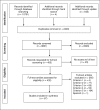Culturally competent healthcare - A scoping review of strategies implemented in healthcare organizations and a model of culturally competent healthcare provision
- PMID: 31361783
- PMCID: PMC6667133
- DOI: 10.1371/journal.pone.0219971
Culturally competent healthcare - A scoping review of strategies implemented in healthcare organizations and a model of culturally competent healthcare provision
Abstract
Background: Culturally and linguistically diverse patients access healthcare services less than the host populations and are confronted with different barriers such as language barriers, legal restrictions or differences in health beliefs. In order to reduce these disparities, the promotion of cultural competence in healthcare organizations has been a political goal. This scoping review aims to collect components and strategies from evaluated interventions that provide culturally competent healthcare for culturally and linguistically diverse patients within healthcare organizations and to examine their effects on selected outcome measures. Thereafter, we aim to organize identified components into a model of culturally competent healthcare provisions.
Methods and findings: A systematic literature search was carried out using three databases (Pubmed, PsycINFO and Web of Science) to identify studies which have implemented and evaluated cultural competence interventions in healthcare facilities. PICO criteria were adapted to formulate the research question and to systematically choose relevant search terms. Sixty-seven studies implementing culturally competent healthcare interventions were included in the final synthesis. Identified strategies and components of culturally competent healthcare extracted from these studies were clustered into twenty categories, which were organized in four groups: Components of culturally competent healthcare-Individual level; Components of culturally competent healthcare-Organizational level; Strategies to implement culturally competent healthcare and Strategies to provide access to culturally competent healthcare. A model integrating the results is proposed. The overall effects on patient outcomes and utilization rates of identified components or strategies were positive but often small or not significant. Qualitative data suggest that components and strategies of culturally competent healthcare were appreciated by patients and providers.
Conclusion: This scoping review used a bottom-up approach to identify components and strategies of culturally competent healthcare interventions and synthesized the results in a model of culturally competent healthcare provision. Reported effects of single components or strategies are limited because most studies implemented a combination of different components and strategies simultaneously.
Conflict of interest statement
The authors have declared that no competing interests exist.
Figures
References
-
- United Nations. For a world on the move: The UN Summit for Refugees and Migrants: UN Refugees and Migrants; 2016. [Available from: http://refugeesmigrants.un.org/world-move-un-summit-refugees-and-migrants.
-
- World Health Organization (WHO) Region of Americas. Regional situation analysis, practices, experiences, lessons learned and ways forward. 2018.
-
- World Health Organization (WHO) European Region. Health of refugees and migrants Regional situation analysis, practices, experiences, lessons learned and ways forward. 2018.
-
- Agency for Healthcare Research and Quality. National Healthcare Quality and Disparities Report. Rockville, MD; 2016.
Publication types
MeSH terms
LinkOut - more resources
Full Text Sources



